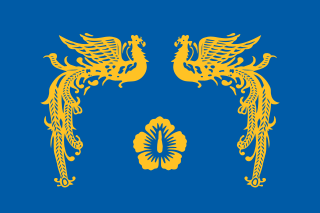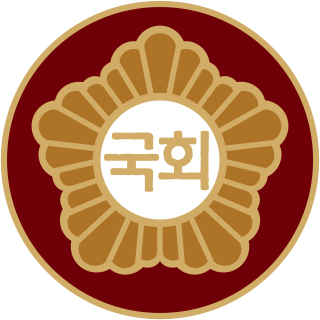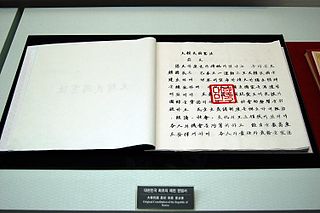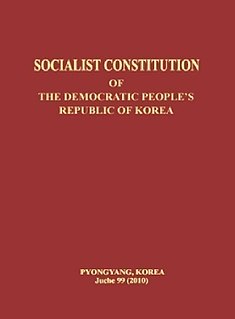
South Korea is a country in East Asia, constituting the southern part of the Korean Peninsula and sharing a land border with North Korea. The name Korea is derived from Goguryeo which was one of the great powers in East Asia during its time, ruling most of the Korean Peninsula, Manchuria, parts of the Russian Far East and Inner Mongolia under Gwanggaeto the Great. Its capital, Seoul, is a major global city and half of South Korea's over 51 million people live in the Seoul Capital Area, the fourth largest metropolitan economy in the world.

The President of the Republic of Korea is the Head of State, the Head of Government, the Commander-in-chief of the Armed Forces, the Chairperson of the Cabinet, the Chief Executive of the Government and the Head of the Executive Branch.

A Korean name consists of a family name followed by a given name, as used by the Korean people in both South Korea and North Korea. In the Korean language, ireum or seongmyeong usually refers to the family name (seong) and given name together.

The Joseon dynasty was a Korean dynastic kingdom that lasted for approximately five centuries. Joseon was founded by Yi Seong-gye in July 1392 and was replaced by the Korean Empire in October 1897. It was founded following the aftermath of the overthrow of Goryeo in what is today the city of Kaesong. Early on, Korea was retitled and the capital was relocated to modern-day Seoul. The kingdom's northernmost borders were expanded to the natural boundaries at the rivers of Amnok and Tuman through the subjugation of the Jurchens. Joseon was the last dynasty of Korea and its longest-ruling Confucian dynasty.

Japanese Korea refers to the period when Korea was under Japanese rule, between 1910 and 1945.

The National Assembly of the Republic of Korea, often shortened to the National Assembly in domestic English-language media, is the 300-member unicameral national legislature of South Korea. Elections to the National Assembly are held every four years. The latest legislative elections were held on 13 April 2016. Single-member constituencies comprise 253 of the assembly's seats, while the remaining 47 are allocated by proportional representation. Members serve four-year terms.
Koreans in Japan comprise ethnic Koreans who have permanent residency status in Japan or who have become Japanese citizens and whose immigration to Japan originated before 1945 or who are descendants of those immigrants. They are a distinct group from South Korean nationals who have emigrated to Japan after the end of World War II and the division of Korea.

The Japan–Korea Treaty of 1910, also known as the Japan–Korea Annexation Treaty, was made by representatives of the Empire of Japan and the Korean Empire on August 22, 1910. In this treaty, Japan formally annexed Korea following the Japan–Korea Treaty of 1905 by which Korea became a protectorate of Japan and Japan–Korea Treaty of 1907 by which Korea was deprived of the administration of internal affairs.

South Korean nationality law defines who is a South Korean citizen, as well as the procedures by which one may be naturalized into South Korean citizenship or renounce it.

The Constitution of the Republic of Korea is the supreme law of South Korea. It was promulgated on July 17, 1948, and was last revised on October 29, 1987.

Dog meat is the flesh and other edible parts derived from dogs. Historically, human consumption of dog meat has been recorded in many parts of the world. In the 21st century, dog meat is consumed in some regions of China, South Korea, Vietnam, and Nigeria and it is eaten or is legal to be eaten in other countries throughout the world. Some cultures view the consumption of dog meat as part of their traditional, ritualistic, or day-to-day cuisine, and other cultures consider consumption of dog meat a taboo, even where it had been consumed in the past. It was estimated in 2014 that worldwide, 25 million dogs are eaten each year by humans.

The Socialist Constitution of the Democratic People's Republic of Korea is the constitution of North Korea. It was approved by the 6th Supreme People's Assembly at its first session on 27 December 1972, and has been amended and supplemented in 1998, 2009, 2012, 2013, 2016 and 2019. It replaced the country's first constitution which was approved in 1948.

The Nationality Law of the Democratic People's Republic of Korea governs who is a citizen of the DPRK, and how one may gain or lose such citizenship.

Internet censorship in South Korea is similar to other developed countries but contains some unique elements such as the blocking of pro-North Korea websites, which led to it being categorized as "pervasive" in the conflict/security area by OpenNet Initiative. It is also one of the few developed countries that block pornography and material considered harmful to minors as they are illegal by law. However, this law is very loosely applied, with many pornography websites and nudity content still freely accessible. It also does not apply to social media websites, which is a common source of legal pornography in South Korea.

The Law of North Korea is a codified civil law system inherited from the Japanese and influenced by the Soviet Union. It is governed by a socialist constitution and operates within the political system of North Korea.
Law of the Jungle is a South Korean reality-documentary show that airs on SBS. Each episode features celebrities sent to survive in remote locations around the world. The show was first aired on October 21, 2011. The show's 300th episode aired in 2018.
Feminism in South Korea is the origin and history of the movement of feminism or women's rights in South Korea.

Abortion in South Korea is illegal in most circumstances, but illegal abortions are widespread and commonly performed at hospitals and clinics. The South Korean Constitutional Court on April 11, 2019 ruled the abortion ban unconstitutional and ordered the law's revision by the end of 2020.













